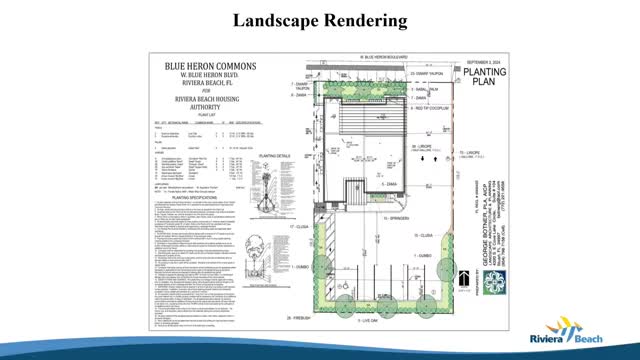Council asks staff to study civic open-space pay-in-lieu and whether funds can address neighborhood infrastructure
Get AI-powered insights, summaries, and transcripts
Subscribe
Summary
Council directed staff to analyze an amendment to allow working-waterfront projects to pay a contribution in lieu of civic open space and to examine whether those funds (or alternatives) can address infrastructure needs after staff warned current law limits in-lieu funds to civic-open-space uses.
Riviera Beach City Council on Feb. 5 directed staff to study options that would give working-waterfront projects more flexibility in meeting civic open-space requirements, and to evaluate whether payment-in-lieu funds could be used to address nearby infrastructure needs.
Staff background: Clarence Sermons, director of development services, summarized the city’s civic open-space code (section 31-538) and explained that the requirement is triggered for downtown projects on sites of one acre or larger or when an existing building adds 20% or more gross floor area. Sermons outlined six accepted civic-open-space typologies in the code (green, plaza, attached green, playground, square, waterfront green) and described recent downtown projects that used on-site plazas, art-centered spaces or linear greens as their civic open space.
Legal and policy constraints: Sermons said legal review showed revenue collected under the civic open-space fee-in-lieu would need to be used to develop civic open space and that the amendment could create pressure for other districts to seek similar buyouts. He also noted that certain comprehensive-plan policies commit the city to create and expand civic open space in downtown districts. City staff recommended retaining the requirement but exploring options to increase developer flexibility while protecting guaranteed public spaces.
Council direction: After public comment and council discussion, Councilmember Spieridis moved — and council unanimously approved — a direction for staff to examine a targeted text amendment for the working-waterfront/downtown-marine zoning district that would allow an option for contribution in lieu of civic open space; the study should explicitly examine whether (and under what legal authority) such funds could instead be used for infrastructure in adjacent neighborhoods, alternative locations for civic open space, and timing mechanisms to ensure open space is delivered without slowing project construction.
Public comment: Brandy Davis Balzano, a Lakeview Park resident, supported giving staff and council flexibility and urged caution, citing security and maintenance concerns if a small pocket park were created in a low-activity marine area. Thompson and Sermons told council staff had already negotiated a relocation of civic open space for a currently pending project to a higher-visibility location along Broadway after hearing community concerns.
Next steps: Staff will return with draft ordinance language and legal analysis reflecting the council’s direction, including possible limits or conditions if pay-in-lieu is permitted.
